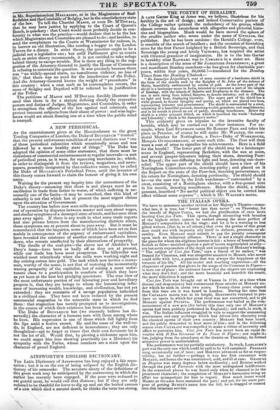THE ITALIAN OPERA.
WE have to announce another revival at her Majesty's Theatre—some- what late, it is true, but" better late than never ": on Thursday, for the benefit of Signor COSTA, we had the gratification of once more hearing Cosi fan Tulle. This opera, though abounding with beauties of the highest order, cannot be ranked among the most perfect of Mozawr's compositions for the stage: and let it be a warning to less gifted writers, (that is, to all others,) that even the genius of that great man could not with impunity ally itself to dulness, grossness, or ab- surdity. Even MOZART must submit to pay the penalty consequent upon such an indiscreet alliance. There is not a single character in the piece for whom the slightest interest is felt : a brace of heartless jilts, foolish as false—matched against a pair of lovers unprincipled as silly— are but sorry expounders of the depth and intensity of MOZART'S feeling. "The subject of Cosi fan Tune," says a friend of its author," was framed for Cimarosa, and was 'altogether unsuited to Mozart, who never could trifle with love, a passsion that was always the happiness or the torment of his life." All his tender and touching expression—all the eloquence of passion that glows in the songs of the Countess in Figaro- is here out of place : the audience know that the singers are expressing what they don't feel ; and the more beautiful and heartfelt the music, the more ridiculous it appears.
Cosi fan Tulle was brought out at Vienna in 1788, at a time when disease and despondency had commenced those attacks on MOZART un- der which he sank in about two years. Twenty-three years elapsed from this time ere it was heard in London. During the time that the CATALAN' mania was at its height, BEnximorrs ventured to pro- duce an opera in which her great rival was not concerned, and to pit MOZART against Pucrrre. The performance was hailed as the com- mencement of a new sera (for before this time only one of MOZART'S operas had been publicly performed in England); and such, in truth, it was. The Italian influence struggled in vain to support the unmeaning prettinesses and easy nothings which had driven into obscurity even the classical operas of their own country : MOZART had been heard, and the public demanded to hear more of him ; and in the following season even CATALAN' was compelled to make a virtue of necessity and affect to patronize him. Cosi fan Tutie has never been an equal fa- vourite with II Don Giovanni or Le Nozze di Figaro ; nor ought it; but, judging from the attendance at the theatre on Thursday, its former attractive power is undiminished.
The performance was but partially satisfactory. In truth, LABLACHE'n part was the only one which could be said to be well sustained. PERSIAN' sang occasionally out of tune ; and MOLT'S" advanced as far as respec- tability, but no further — perhaps it was her first encounter with MOZART, and hence she was constrained, cold, and ill at ease. GRANCHI as Despina was many degrees below mediocrity ; and Rumux walked through the part of Ferrando with the most undisguised indifference. In the concerted pieces he was heard only when he chanced to be the prominent character ; the completion of MOZART'S harmonies being an affair too unimportant for him to regard. How much better would Memo or Gussco have sustained the part! and yet, for the mere pur- pose of getting ItunDa's name into the bill, he is dragged or coaxed into this reluctant service.


























 Previous page
Previous page